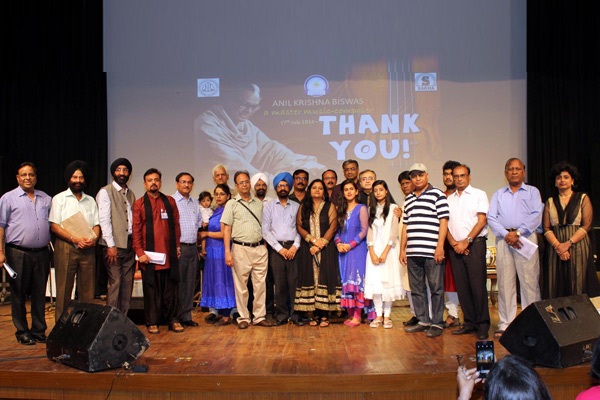For more on radio and music business news. | Click on RNMBiz

NEW DELHI: Connoisseurs of music have expressed regret that the late music director Anil Biswas was denied any national honour despite his memorable music.
Rich tributes were paid to the legendary music director on the occasion of his twelfth death anniversary on 31 May at a function organised by Civil Services Officers Institute (CSOI) in New Delhi.
Speaking on the occasion, CSOI GM Col Rajinder Kumar stated that such was the stature of Anil Biswas that on his demise on 31 May 2003, the then Prime Minister Atal Bihari Vajpayee had said, "Anil Biswas was a doyen of film music who stuck the rare balance between classical purity of music and popular pulse. He is an enduring legacy as he introduced many talented singers and innovations to the Indian film music".
A musical program of compositions of Anil Biswas sung by top singers from the national capital region of Delhi was presented on the occasion by veteran music connoisseur Amarjit Singh Kohli, Chairman of the Sakha Cultural Society, and produced by Shailaja Menon Madhavan who also scripted and hosted the programme and was the main singer of the evening.
Shailaja Madhavan was presented with prestigious Sakha Award on the occasion.
Kohli, who had planned and conceived the programme, urged the Government to posthumously award Anil Biswas with a Padma Award.
He said Biswas pioneered three things in the film industry for the first time, which was acknowledged by Vajpayee. These were the introduction of full-fledged orchestra, folk music, and classical music.
Biswas is credited with giving breaks to many singers including Begum Akhtar, Zohrabai Ambalewali, Mukesh, Talat Mehmood, and many others. He was also a revolutionary and went to jail many times during the freedom struggle.
Born on 7 July 1914 in Barisal in Bangladesh, Biswas died in New Delhi on 31 May 2003.
He started singing and composing music in Calcutta in1932 when he was just 18 years old. In Calcutta his contemporaries included musical legends like RC Boral, Kundan Lal Saigal, Pankaj Mullick, and SD Burman.
He shifted to Mumbai later and became a full-fledged music director of the film ‘Dharm Ki Devi’ in 1935 when he was just 21 years old. He was called the "Chacha" of Indian film music, RC Boral being termed the father.
His musical career spanned more than 60 years from 1932 to 1975 and composed music for 83 films. His famous compositions include ‘Door Hato Ai Duniyawalo’ Kismat in the year 1943, ‘Dil Jalta Hai To Jalne De" which was crooned by Mukesh from the film ‘Pehli Nazar’ in 1945 and ‘Ai Dil Mujhe Aisi Jageh Le Chal" which was sung by Talat Mehmood from the film ‘Aarzoo’ in the year 1950.
According to Lata Mangeshkar, it was Anil Biswas who taught her the two most important things that later shaped her singing career. One was how to take breath in between mouthing words without anyone noticing it, and how to pronounce words so that each line is clearly audible and clear to a listener.